Access & Success
First Generation StudentsTHE PATH OF A FIRST GEN STUDENT
OVERCOMING BARRIERS TO ACCESS & SUCCESS
A first generation student is a student who is the first in their immediate family to pursue a college degree or credential. As such, enrolling in college and completing a degree is a huge accomplishment—one that can lead to social and economic mobility for both a first generation student and their family. However, first generation students face significant barriers to access and success in college. Without parents who attended college, these students may be less familiar with admissions processes and financial aid applications. Once enrolled, they are often less academically prepared than their peers, which can lead to delays in their path to graduation.
At NOVA, over 10,000 students identify as a first generation student. Each one of these students is more at risk of not graduating than their continuing generation peers. In the 2017–2023 Strategic Plan, NOVA commits to having a positive impact on the social and economic mobility of all students. Therefore, understanding the characteristics of this at-risk student population will be critical to meeting the institution’s goals of helping every student to succeed.
Nationwide NUMBERS
34%
of all college students are first generation.1
38%
of all community college students are first generation.1
56%
of first generation students earned a degree or were still enrolled after six years.2
54%
of first generation students who left college without a degree cited financial constraints as the reason3
74%
of continuing generation students earned a degree or were still enrolled after six years.2
Nationwide NUMBERS
34%
of all college students are first generation.1
38%
of all community college students are first generation.1
54%
of first generation students who left college without a degree cited financial constraints as the reason3
54%
of first generation students who left college without a degree cited financial constraints as the reason3
56%
of first generation students earned a degree or were still enrolled after six years.2
74%
of continuing generation students earned a degree or were still enrolled after six years.2
Barriers to Access



Barriers to Access



First Generation

Continuing Generation
FIRST GEN STUDENTS AT NOVA
At NOVA, over one-fifth of students report they are the first in their family to attend college. This proportion varies on each campus, with the Woodbridge campus having the largest percentage of first generation students.
FIRST GEN STUDENTS AT NOVA
At NOVA, over one-fifth of students report they are the first in their family to attend college. This proportion varies on each campus, with the Woodbridge campus having the largest percentage of first generation students.
NOVA Student Profile
In Virginia, underserved student populations (USPs) include students who are first generation, of a minority race or ethnicity, from an underserved geographic location, or eligible for a Pell grant. At NOVA, a higher proportion of first generation students exhibit additional characteristics that define USPs—such as belonging to a racial or ethnic minority or receiving a Pell grant—in comparison to their continuing generation peers.4


NOVA Student PRofile
In Virginia, underserved student populations (USPs) include students who are first generation, of a minority race or ethnicity, from an underserved geographic location, or eligible for a Pell grant. At NOVA, a higher proportion of first generation students exhibit additional characteristics that define USPs—such as belonging to a racial or ethnic minority or receiving a Pell grant—in comparison to their continuing generation peers.4



First Generation

Continuing Generation
Beyond NOVA
First generation students often utilize different job market resources than their continuing education peers. They are less likely to take advantage of several on-campus resources that may help them to find a job following graduation. NOVA can work to enhance visibility of these services for first generation and all students.
Virtual and on-campus job fairs
Resume and cover letter workshops
Employer visits to campus
Practice interviews
Learn More
Resources for Students, Faculty, and Staff
First generation students face many unique challenges as the first in their families to navigate the college experience. They are often more unfamiliar with admissions processes, financial aid applications, and enrollment procedures. These students may find it difficult to navigate program and course offerings, and may need additional support understanding the types of jobs available to them upon earning a credential. Each of these challenges can result in delays in graduation and/or transfer to a four-year institution.
NOVA offers a variety of support services and programs to help all students to succeed, many of which can be particularly beneficial for first generation students.
Paying for College
The Financial Aid Office provides financial assistance and advising to help students understand how they can cover the cost of college. Students are encouraged to apply for federal, state, and NOVA-specific scholarships, grants, and loans, including need-based financial aid.
Learn more about financial aid and how to apply at: http://www.nvcc.edu/financialaid/index.html
Pathway to the Baccalaureate
The Pathway to the Baccalaureate program is a partnership between NOVA, K-12 public schools, and George Mason University. The program serves students who need additional guidance as they navigate their educational goals, including first generation students.
Learn more about the pathway program at: https://www.nvcc.edu/pathway/ for more.
Choosing a Program of Study
Counselors and advisors are available on all campuses to assist students with course selection and career advice. Exploring academic programs and choosing a major early can help students stay on track. By meeting regularly with an advisor, students can discuss their academic and career goals and learn more about their options.
Learn more or speak with a virtual counselor through live chat at: http://www.nvcc.edu/advising/index.html
Career Services
Career Services offers a variety of resources to help students to explore career paths and reach their academic and career goals. Students can participate in career assessments, receive feedback on resumes and cover letters, practice interview techniques, and attend on-campus job fairs and career events.
Find the nearest Career Services office and see upcoming events at: http://www.nvcc.edu/careers/index.html
Citations
- (2014). Profile of Undergraduate Students: 2011–2012. Web Tables, U.S. Department of Education.
- Cataldi, E.F., Bennett, C.T., and Chen, X. (2018). First-Generation Students: College Access, Persistence, and Postbachelor’s Outcomes. States In Brief, U.S. Department of Education.
- Redford, J. and Hoyer, K.M. (2017). First-Generation and Continuing-Generation College Students: A Comparison of High School and Postsecondary Experiences. Stats in Brief, U.S. Department of Education.
- (2018). First-Generation Students at NOVA: Fall 2013 through Fall 2017. Office of Institutional Effectiveness and Student Success, Northern Virginia Community College.
- (2014). Profile of Undergraduate Students: 2011–2012. Web Tables, U.S. Department of Education.
- Cataldi, E.F., Bennett, C.T., and Chen, X. (2018). First-Generation Students: College Access, Persistence, and Postbachelor’s Outcomes. States In Brief, U.S. Department of Education.
- Redford, J. and Hoyer, K.M. (2017). First-Generation and Continuing-Generation College Students: A Comparison of High School and Postsecondary Experiences. Stats in Brief, U.S. Department of Education.
- (2018). First-Generation Students at NOVA: Fall 2013 through Fall 2017. Office of Institutional Effectiveness and Student Success, Northern Virginia Community College.
Learn More
Resources for Students, Faculty, and Staff
First generation students face many unique challenges as the first in their families to navigate the college experience. They are often more unfamiliar with admissions processes, financial aid applications, and enrollment procedures. These students may find it difficult to navigate program and course offerings, and may need additional support understanding the types of jobs available to them upon earning a credential. Each of these challenges can result in delays in graduation and/or transfer to a four-year institution.
NOVA offers a variety of support services and programs to help all students to succeed, many of which can be particularly beneficial for first generation students.
Paying
for College
The Financial Aid Office provides financial assistance and advising to help students understand how they can cover the cost of college. Students are encouraged to apply for federal, state, and NOVA-specific scholarships, grants, and loans, including need-based financial aid.
Learn more about financial aid and how to apply at: http://www.nvcc.edu/financialaid/index.html
Pathway
to the Baccalaureate
The Pathway to the Baccalaureate program is a partnership between NOVA, K-12 public schools, and George Mason University. The program serves students who need additional guidance as they navigate their educational goals, including first generation students.
Learn more about the pathway program at: https://www.nvcc.edu/pathway/ for more.
Choosing
a Program of Study
Counselors and advisors are available on all campuses to assist students with course selection and career advice. Exploring academic programs and choosing a major early can help students stay on track. By meeting regularly with an advisor, students can discuss their academic and career goals and learn more about their options.
Learn more or speak with a virtual counselor through live chat at: http://www.nvcc.edu/advising/index.html
Career
Services
Career Services offers a variety of resources to help students to explore career paths and reach their academic and career goals. Students can participate in career assessments, receive feedback on resumes and cover letters, practice interview techniques, and attend on-campus job fairs and career events.
Find the nearest Career Services office and see upcoming events at: http://www.nvcc.edu/careers/index.html
Citations
- (2014). Profile of Undergraduate Students: 2011–2012. Web Tables, U.S. Department of Education.
- Cataldi, E.F., Bennett, C.T., and Chen, X. (2018). First-Generation Students: College Access, Persistence, and Postbachelor’s Outcomes. States In Brief, U.S. Department of Education.
- Redford, J. and Hoyer, K.M. (2017). First-Generation and Continuing-Generation College Students: A Comparison of High School and Postsecondary Experiences. Stats in Brief, U.S. Department of Education.
- (2018). First-Generation Students at NOVA: Fall 2013 through Fall 2017. Office of Institutional Effectiveness and Student Success, Northern Virginia Community College.









